人教版九年级英语第三单元教学设计讲课教案
- 格式:doc
- 大小:170.00 KB
- 文档页数:14
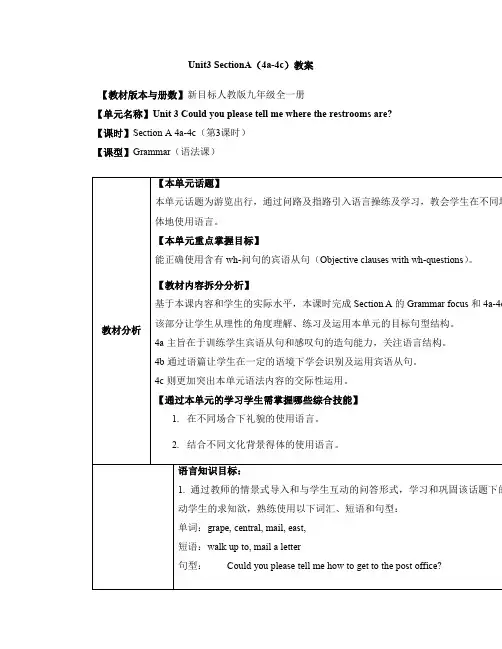
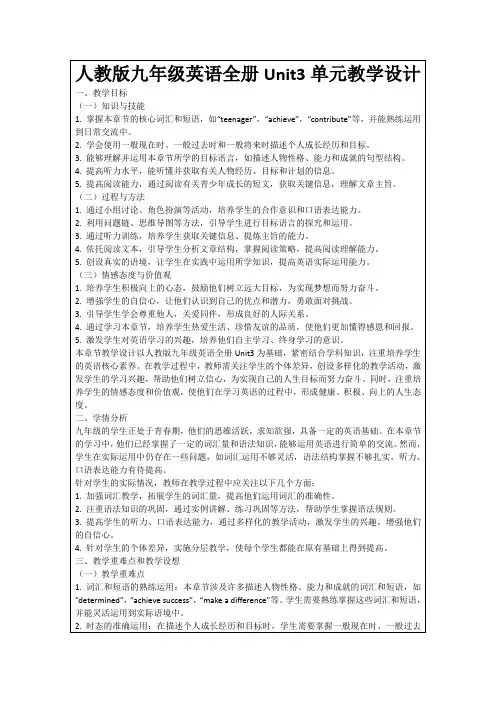
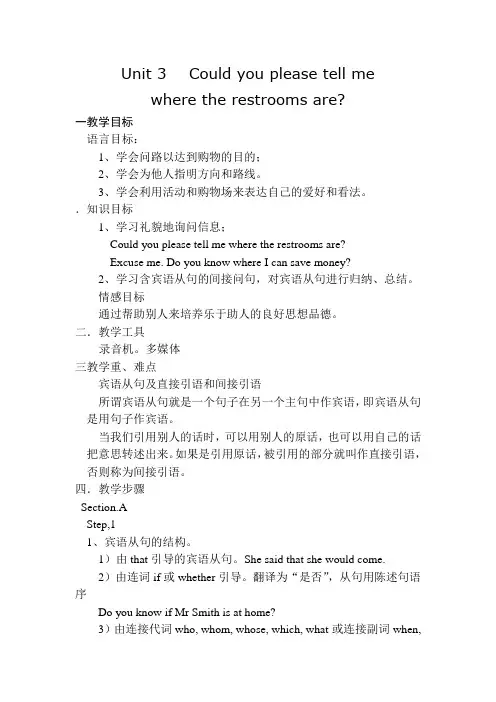
Unit 3 Could you please tell mewhere the restrooms are?一教学目标语言目标:1、学会问路以达到购物的目的;2、学会为他人指明方向和路线。
3、学会利用活动和购物场来表达自己的爱好和看法。
.知识目标1、学习礼貌地询问信息;Could you please tell me where the restrooms are?Excuse me. Do you know where I can save money?2、学习含宾语从句的间接问句,对宾语从句进行归纳、总结。
情感目标通过帮助别人来培养乐于助人的良好思想品德。
二.教学工具录音机。
多媒体三教学重、难点宾语从句及直接引语和间接引语所谓宾语从句就是一个句子在另一个主句中作宾语,即宾语从句是用句子作宾语。
当我们引用别人的话时,可以用别人的原话,也可以用自己的话把意思转述出来。
如果是引用原话,被引用的部分就叫作直接引语,否则称为间接引语。
四.教学步骤Section.AStep,11、宾语从句的结构。
1)由that引导的宾语从句。
She said that she would come.2)由连词if或whether引导。
翻译为“是否”,从句用陈述句语序Do you know if Mr Smith is at home?3)由连接代词who, whom, whose, which, what或连接副词when,where, how, why等引导。
从句用陈述句语序。
Do you know who broke the window?I don’t know when I shall finish4)某些形容词之后的从句有时也被看作是宾语从句。
如:afraid, wure, sorry, glad, worried, angry, confident.I’m sorry that I’m late again.They were angry that they had lost the chance.2、宾语从句的时态一致主句是过去时,宾语从句要用过去时态;主句是现在时或将来时,宾语从句则该用什么时态就用什么时态。
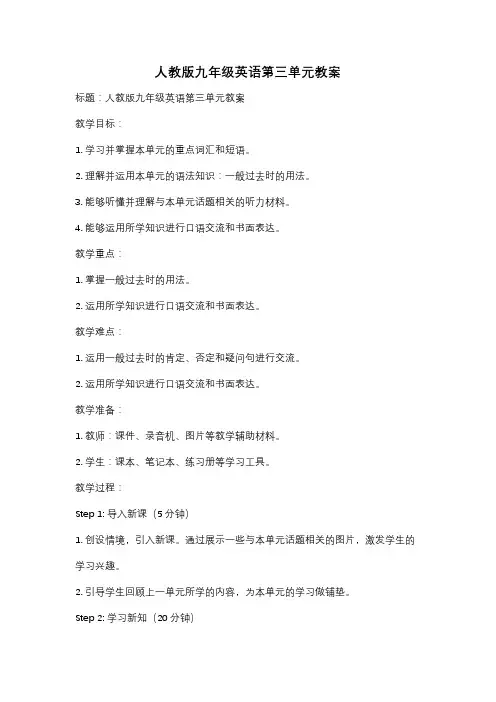
人教版九年级英语第三单元教案标题:人教版九年级英语第三单元教案教学目标:1. 学习并掌握本单元的重点词汇和短语。
2. 理解并运用本单元的语法知识:一般过去时的用法。
3. 能够听懂并理解与本单元话题相关的听力材料。
4. 能够运用所学知识进行口语交流和书面表达。
教学重点:1. 掌握一般过去时的用法。
2. 运用所学知识进行口语交流和书面表达。
教学难点:1. 运用一般过去时的肯定、否定和疑问句进行交流。
2. 运用所学知识进行口语交流和书面表达。
教学准备:1. 教师:课件、录音机、图片等教学辅助材料。
2. 学生:课本、笔记本、练习册等学习工具。
教学过程:Step 1: 导入新课(5分钟)1. 创设情境,引入新课。
通过展示一些与本单元话题相关的图片,激发学生的学习兴趣。
2. 引导学生回顾上一单元所学的内容,为本单元的学习做铺垫。
Step 2: 学习新知(20分钟)1. 向学生介绍本单元的重点词汇和短语,并进行发音和拼写练习。
2. 通过教师示范和学生模仿的方式,讲解一般过去时的肯定、否定和疑问句的构成和用法。
3. 引导学生进行口语练习,巩固一般过去时的用法。
Step 3: 听力训练(15分钟)1. 播放与本单元话题相关的听力材料,要求学生仔细听并回答相关问题。
2. 听完后,与学生一起讨论答案,提高学生的听力理解能力。
Step 4: 口语交流(15分钟)1. 设计一些与本单元话题相关的口语练习题目,让学生两人一组进行对话练习。
2. 鼓励学生使用一般过去时的句型进行交流,并给予及时的反馈和指导。
Step 5: 书面表达(15分钟)1. 提供一篇关于本单元话题的写作素材,要求学生根据所学知识进行书面表达。
2. 学生完成写作后,教师进行评改,并给予必要的指导和建议。
Step 6: 小结与作业布置(5分钟)1. 小结本节课的学习内容,强调一般过去时的用法和相关词汇短语的掌握。
2. 布置相关的练习作业,巩固所学知识。
教学反思:本节课通过多种教学手段,如图片展示、听力训练、口语交流和书面表达等,使学生在听、说、读、写各个方面得到综合提高。
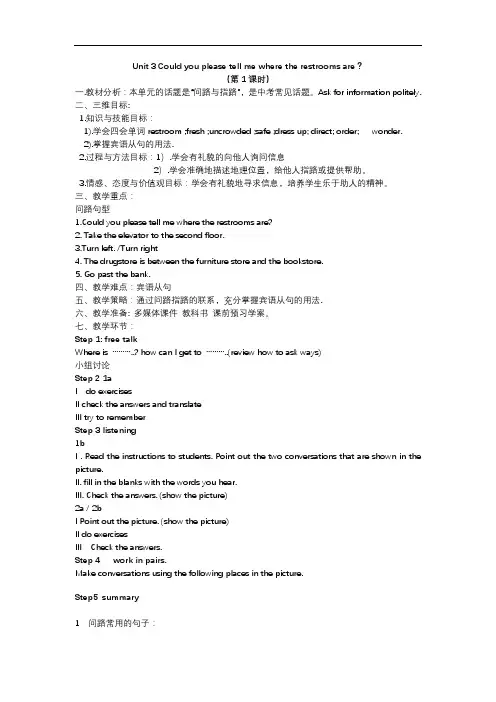
Unit 3 Could you please tell me where the restrooms are?(第1课时)一.教材分析:本单元的话题是“问路与指路”,是中考常见话题。
Ask for information politely.二、三维目标:1.知识与技能目标:1).学会四会单词restroom ;fresh ;uncrowded ;safe ;dress up; direct; order; wonder.2).掌握宾语从句的用法.2.过程与方法目标:1).学会有礼貌的向他人询问信息2).学会准确地描述地理位置,给他人指路或提供帮助。
3.情感、态度与价值观目标:学会有礼貌地寻求信息,培养学生乐于助人的精神。
三、教学重点:问路句型1.Could you please tell me where the restrooms are?2. Take the elevator to the second floor.3.Turn left. /Turn right4. The drugstore is between the furniture store and the bookstore.5. Go past the bank.四、教学难点:宾语从句五、教学策略:通过问路指路的联系,充分掌握宾语从句的用法.六、教学准备: 多媒体课件教科书课前预习学案。
七、教学环节:Step 1: free talkWhere is ………..? how can I get to ………..(review how to ask ways)小组讨论Step 2 1aI do exercisesII check the answers and translateIII try to rememberStep 3 listening1bI . Read the instructions to students. Point out the two conversations that are shown in the picture.II. fill in the blanks with the words you hear.III. Check the answers. (show the picture)2a / 2bI Point out the picture. (show the picture)II do exercisesIII Check the answers.Step 4 work in pairs.Make conversations using the following places in the picture.Step5 summary1 问路常用的句子:Do you know where …is ?Can you tell me how can I get to …?Could you tell me how to get to …?2 英语中表示方位的表达有:next to 贴近,靠近close to 在附近;on the left/right side在左/右边;in the middle of 在……的中间;in front of 在……的前面;between …and …在……之间;be opposite to 在……对面;across from 在……对面。
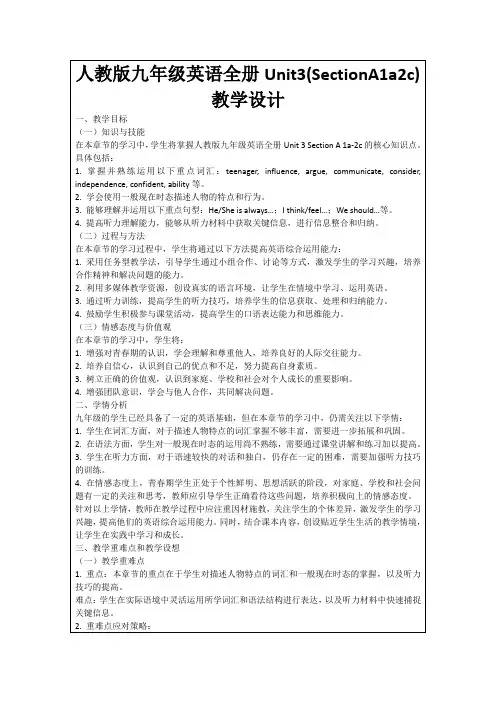
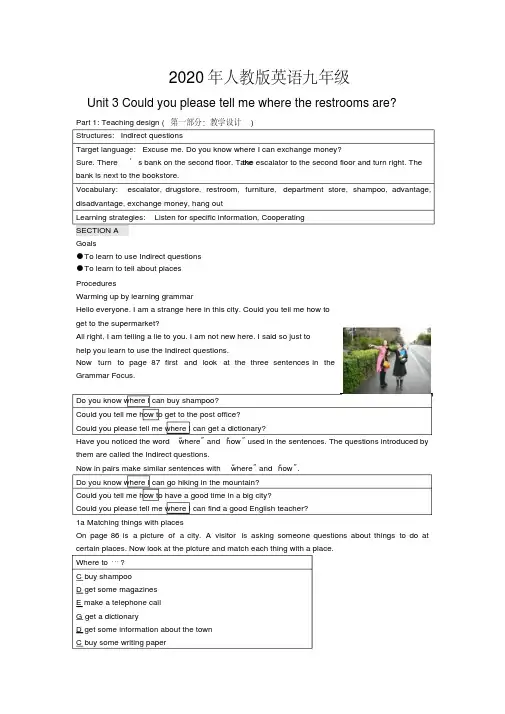
2020年人教版英语九年级Unit 3 Could you please tell me where the restrooms are?Part 1: Teaching design (第一部分:教学设计)Structures: Indirect questionsTarget language: Excuse me. Do you know where I can exchange money?Sure. There’s bank on the second floor. Takethe escalator to the second floor and turn right. The bank is next to the bookstore.Vocabulary: escalator, drugstore, restroom, furniture, department store, shampoo, advantage, disadvantage, exchange money, hang outLearning strategies: Listen for specific information, CooperatingSECTION AGoals●To learn to use Indirect questions●To learn to tell about placesProceduresWarming up by learning grammarHello everyone. I am a strange here in this city. Could you tell me how toget to the supermarket?All right, I am telling a lie to you. I am not new here. I said so just tohelp you learn to use the Indirect questions.Now turn to page 87 first and look at the three sentences in theGrammar Focus.Do you know where I can buy shampoo?Could you tell me how to get to the post office?Could you please tell me where I can get a dictionary?Have you noticed the word “where” and “how” used in the sentences. The questions introduced by them are called the Indirect questions.Now in pairs make similar sentences with “where” and “how”.Do you know where I can go hiking in the mountain?Could you tell me how to have a good time in a big city?Could you please tell me where I can find a good English teacher?1a Matching things with placesOn page 86 is a picture of a city. A visitor is asking someone questions about things to do at certain places. Now look at the picture and match each thing with a place.Where to…?C buy shampooD get some magazinesE make a telephone callG get a dictionaryD get some information about the townC buy some writing paperE buy some stampsB save money1b Listening and completingIt is difficult to get around in a new place. Now listen to the recording and complete the dialoguein the picture on page 86.TapescriptConversation 1Girl1: Excuse me. Could you tell me where I can buy some stamps?Boy1: Yes. There’s a post office on Center Street.Girl1: Oh. Can you tell me where Center Street is?Boy1: Sure. Go past the bank. Center Street is on your right.Girl1: Thanks a lot.Boy1: No problem.Conversation 2Girl2: Excuse me. Do you know where I can save money?Boy2: Sure. There’s a bank on Main Street.Girl2: Oh. Could you please tell me how to get there?Boy2: Yes... Go straight ahead. The bank is on your left.Girl2: Thank you.Boy2: You’re welcome.Write your words here in the speech bubbles.A: Could you tell me where I can buy some stamps?B: Yes. There’s a post office on Center Street.A: Excuse me. Do you know where I can save money?B: Sure. There’s a bank on Main Street.Read the tapescript and try to underline all the useful expressions used and circle the Indirect questions.1c Doing pairworkIn 1a there are many phrases describing activities. Now use them to make up conversations to talk about your own city. (The Indirect questions are circled.)A: Excuse me. Can you please tell me where I can buy shampoo in this city?B: Sure. There’s a department store over there.A: Excuse me. Can you please tell me where I can get some magazines?B: Sure. There’s a post office around the corner.A: Excuse me. Can you please tell me where I can make a telephone call?B: Sure. There’s a post office one hundred meters down the street.A: Excuse me. Can you please tell me where I can get some information about the town?B: Sure. There’s a library opposite of the hospital.A: Excuse me. Can you please tell me where I can get some writing paper?B: Sure. There’s a department store close to the bus station.A: Excuse me. Can you please tell me where I can buy some stamps?B: Sure. There’s a post office beside the library over there.A: Excuse me. Can you please tell me where I can save money.on the main library over there.B: Sure. There’s a big bank beside the café2a Listening and numberingDo you like shopping? If you do come and listen to the directions for going shopping around anew city.TapescriptBoy1:Excuse me. Can you tell me where I can buy some shampoo?Boy2:Yes. There’s a drug store on the second floor. Um. Let me think... Take the escalator to the second floor and then... then you turn left. Let’s see...Then go past the bank. And um... The drug store is between the furniture store and the bookstore. You should be able to get shampoo there.Boy1:OK, great. Thanks a lot.Boy2:You’re welcome.While listening please number the directions in the order that you hear them.Take the elevator to the second floor.2 Turn left.1 Take the escalator to the second floor.Turn right.4 The drugstore is between the furniture store and the bookstore.3 Go past the bank.Read the tapescript for the Indirect questions and the useful expressions. Circle the Indirect questions and underline the useful expressions.2b Listening and drawingDo you like drawing. Now listen to the recording again to draw a line on the picture on page 87 to show how the boy walks to the drugstore.2c Doing pairworkWhat else do like to buy? Then make conversations in pairs using the otherplaces in the picture on page 87.A: Excuse me. Do you know where I can exchange money?a bank on the second floor. Take the escalator to the second floor and turn right. B:Sure. There’sThe bank is next to the bookstore.A: Excuse me. Do you know where I can buy music CD?s a Music Magic shop on the first floor. Don’ttake the escalator. It is next to the B:Sure. There’escalator room.A: Excuse me. Do you know where I can get a dictionary?a bookstore on the second floor. Take the escalator to the second floor and turn B:Sure. There’sright. The bookstore is next to the bank.A: Excuse me. Do you know where I can buy some candies?B:Sure. There’s a drugstore on the second floor. Take the escalatorto the second floor and turn right. The bank is next to the bookstore.A:Excuse me. Do you know where I can buy a desk?a furniture store on the second floor. Take the escalator toB:Sure. There’sthe second floor and turn right. The bank is next to the drugstore.Now read aloud the conversations again to Circle the Indirect questions and underline the usefulexpressions.3a Reading and listingOn page 88 is an article about going to a mall. Now read it to list the advantages anddisadvantages of going to a mall. While you read, Circle the Indirect questions and underline theuseful expressions.They’re all at the mall.After school, a lot of young people go to the mall. We decidedto talk to some students about why they go there.Interviewer: Why do you go to the mall?Yu Yue: I go to the mall because my friends hang out there. But I don’t reallylike it.Interviewer: Oh? Why not?s usually crowded.t fresh. I prefer being outside. Also, it’Yu Yue: The air isn’Interviewer: And how about you?s always something happening. There are a lot of free concertsLi Jun: Oh, I love the mall. There’s also just fun to watch people.there. It’Hu Peng: I like the mall, too. I like to go in the music store and listen to CDs. I also like to look atbooks in the bookstore.Yu Yue: Well, when I go into stores I always spend too much money!Advantages disadvantagessh.There’s always something happening.The air isn’t freThere are a lot of free concerts there. It’s usually crowded.It’s also just fun to watch people.when I go into stores I always spend too muchmoney!I like to go in the music store and listen to CDs.I like to look at books in the bookstore.3b Doing groupworkWhere do you usually hang out with friends? What are the advantages and disadvantages ofhanging out at your house, at a mall or at your school? Now in groups talk about them.A: Where do you usually hang out with your friends?B: We usually go to my friend, Qiu’s place.A: Is that a good place to hang out?B:Well, it has advantages and disadvantages. It’s kind of small. But Qiu’s mom is a wonder cook, so we always have great snacks.A: Where do you usually hang out with your friends?B: We usually go to the bookstore.A: Is that a good place to hang out?B:Well, it has advantages and disadvantages. It’s very big and the air is fresh,too. And we can just read books there. We don’t have to buy books. So wealways have a good time there.A: Where do you usually hang out with your friends at weekends?B: I usually stay at home.A: Is that a good place to hang out for the weekends?B: Well, it has advantages and disadvantages. My room is kind of small. But I have a computerthere. I go online reading and watching. It is a wonderful place. So I always hang in at home.4. Directions challengeNow we are going to challenge one another. Write directions from your school to three certain places. Read the directions to each other and guess the places.A: Go out the front door and take a right. Walk about three blocks. Go past the park, and turn leftonto Oak Street. Then it is the…?B: Then it is the bookstore.A: Go out the back door and take a left. Walk about two blocks. Go past the post office, and turnright onto Chang’an Street. Then it is the…?B: Then it is the Teachers College.A: Go out the side door and take a right. Walk about three blocks. Go past the bus station, and turnleft onto Flag Street. Then it is the…?B: Then it is the lake.Closing down by looking and sayingTo bring the period to an end let’s look at the picture and talk about things happening in it.SECTION BGoalsTo learn to talk about places in the cityTo learn to read about placesProceduresWarming up by thinking about How to ask for directions when travelingBEST PROCEDURE:◆Get the name and address of the place you wish to visit.◆Talk to the Hotel Manager or someone that can read and write. If they get weak looking, orthey hesitate to read, do not embarrass them, go to the next person. The probably cannot read.◆After you have found hopefully someone that speaks your language or English you can start toask questions...1a Putting wordsOn page 89 is a list of words and a box with places. Now go over them and put in words besidethe place, the most important quality words first.Places Qualities1. restroom Clean→safe→uncrowded2. museum Fascinating→interesting→beautiful3. restaurant Delicious→uncrowded→inexpensive4. park Big→interesting→clean5. subway Convenient→safe→6. mall Uncrowded→inexpensive→1b Doing pairworkYou are familiar with the words in 1a. Now use them to talk about your city.A: The Fine Arts Museum is really interesting.B:Yes, and it’s beautiful, too.A: The Computer Room is really big.B:Yes, and it’s convenient, too.A: The Dining Hall is really clean.B: Yes, and the food is cheep, too.A: The Bus Station is really safe.B:Yes, and it’s uncrowded, too.A: The Central Square is really fascinating.B: Yes, and it’s not far away, either.2a Listening and writingSome tourists are going around your city. They are asking about things. Now listen to them talking and write what they ask about.Conversation 1Boy1: Could you tell me where there’s a good place to eat?Clerk:Of course. There are a lot of good restaurants in Sunville. What kind offood are you looking for?Boy:Vegetarian.Clerk:I’d try Green Land. They have delicious salads.Conversation 2Girl: Do you know if there are any public restrooms around here?Clerk: Yes. You’ll find some at the corner of Market and Middle Streets.Girl: Ummm... are they clean?Clerk: Oh, yes. They’re very clean.Conversation 3Mother: Could you tell me if there is a good museum in Sunville?Clerk:Well, we have several. What kind of museums do you like—history? Science? A children’s museum?Father: How about history? I like history museums. They’re fascinating.Girl1: Oh, Dad! History museums are boring. Let’s go to a science museum.Boy2: Science? We always go to science museums. I don’t like science museums. I want to go to a children’s museum. They’re more fun.Girl2: Well I’m too old for a children’s museum. Why don’t we go to an art museum?Clerk:Why don’t you go to the computer museum? There are a lot of fun things for childrenthere. You can learn all about the history of computers, as well as learn about science.Family: That’s a great idea! Let’s go to the computer museum. How do we get there?Do you know what the tourists are asking about?The tourists ask about…Conversation 1 RestaurantsConversation 2 public restroomsConversation 3 a good museum2b Listening and writingNow you are to listen to the conversations for the second time. Listen for where the man says thetourists should go.The tourists should go to…Conversation 1 Green LandConversation 2 The corner of Market and Middle StreetsConversation 3 The computer museumTo make a better use of the listening exercise we shall go on to read the tapescripts. While youread, Circle the Indirect questions and underline the useful expressions.2c Doing pairworkFor fun and for learning let’s role play the conversations between the man and the tourists. Who will be the man? All right, it’s you, Zhao Hongtao.to eat?A:Can you tell me where there’s a good placeB: Of course. What kind of food do you like?A: I like vegetarian food.B: There are a lot of good restaurants in Sunville. Why not go to GreenLand. They have delicious salads.A: Can you tell me if there are any public restrooms around here?at the corner of Market and Middle Streets.B: Yes, there’s oneA: A re they clean?B: Oh, no. They’re very dirty.A: Could you tell me if there is a good museum in Sunville?computer museum at the corner? There are a lot of fun things for both children andB:There’s aparents.A: That’s a great place! Let’s go to the computer museum. How do we get there?B: Take Bus 11.3a Reading and fillingGo to page 90, please. Read the article on the left and fill in the charts on the right. While readingtry to underline all the useful expressions and circle all the connectivesEat, have fun and learn in Watertown!Watertown is a great place for the family to take a vacation.. A differentTeenagers will want to visit the world’s largest water slidesand eat at Uncle Bob’s. They haveevery night. Kids will enjoy the Clown City Caférock band plays at Uncle Bob’sorganized games and the staff dress up as clowns.a lot for parents in Watertown. If they love good food, they can find it at the Farmer’s There’s alsoMarket where the food is both delicious and cheap. While the children have fun, parents can takethe dance lessons on the beach. And everyone can learn something in Watertown. There are threemuseums!Teenagers love the Sports Museum and kids enjoy the Science Museum. Parents will spend many happy hours walking through the History Museum.After reading fill in the chart on page 90 on the right.Kids Teenagers ParentsEat Uncle Bob’sFarmer’s Market Have fun Clown City CaféWater slides Dance lessonsLearn Science Museum Sports Museum History Museum3b Completing a tour guideOn page 90 is an unfinished tour guide to Sunville. Now turn back to 2a and 2b for information to finish it.SUNVILLE has something for everyone. If you’re looking for museums,you will find several here. History museums are fascinating to parents.But kids may find them boring. In a science museum you can learn lots ofthings. Children’s museums are more fun. An art museum is interesting topeople who like arts. If you go to the computer museum you will find alot of fun things for children there. They can learn all about the history ofcomputers, as well as learn about science.IN SUNVILLE there are a lot of good restaurants, too. They are nice places to eat. You can find vegetarian food and meats, too. Green Landoffers delicious salads.Public restrooms around SUNVILLE are clean and beautiful. You’ll find some easily at the corner of Market and Middle Streets.3c Write a guide to your city or townMY HOMETOWN: TAIYUANTaiyuan, the capital city of Shanxi Province, lies in the north basin of Middle Jin (Jin is another name for Shanxi Province) and crosses the River Fen. The city area administers three districts,one subdivided city and five counties. The history of the city can be traced back to over 2,400 years ago. It was established in 497 BC, the end of the Spring and Autumn Period (the slavery Period in China) and was named Jinyang, the northern bank of the Jin River. In Chinese, the northern bank of waters is called yang. In 982, Song Taizong, Zhao Kuangyi, the second emperorof the Song Dynasty burned and flooded Jinyuan City. After that, he ordered one of the officials,Pan Mei to build Taiyuan City in Tangming Town, north of Jinyuan City. Thus, came the present Taiyuan City. Taiyuan, in Chinese, means the greatest plain. In fact, it is dominated by rugged hills and hilly areas. Only one-fifth of the whole area is plains. Taiyuan is surrounded by mountains inthe east, west and north; only the southern part is alluvial plains. Taiyuan abounds in various minerals, especially coal and iron, so honors the name, "the home of coal and iron." Taiyuan is of continental climate at temperate zone. It is dry and cold in winter, hot and rainy in summer, dusty and windy in spring, cool and comfortable in autumn. The annual averagetemperature is 9.5 Degree Celcius.4 Doing groupworkOne of the group member is to role play the information booth worker, and theothers are the tourists. The tourists are asking about your city.Tourist: What is Taiyuan?Information booth worker: It is the capital city of Shanxi Province.Tourist: Where is Taiyuan?Information booth worker: It lies in the north basin of Middle Jin (Jin is another name for Shanxi Province) and crosses the River Fen.Tourist: How many districts are there in Taiyuan?Information booth worker: The city area administers three districts, one subdivided city and five counties.Tourist: How old is the city?Information booth worker: The history of the city is as old as 2,400 years. It was established in 497 BC, the end of the Spring and Autumn Period (the slavery Period in China). What was its old name?Tourist:Information booth worker: It was named Jinyang, the northern bank of the Jin River. In Chinese, the northern bank of waters is called yang.…Closing down by going around TaiyuanAt the end of the period I will take you on a trip to Taiyuan. Come with me.SELF CHECK1 Fill in blanks with the correct word given in its correct form.Beautiful, safe, delicious, convenient, fascinatingconvenient.1.I live right next to a supermarket. It’s very2.I find stamps fascinating. I’ve been collecting them for many years.delicious.3.Mr Tan makes the best noodles in town. They’re4.Put your wallet in a safe place.2. Looking and writingThere is a map on page 91 in the middle. Look at it and ask five questions. Answer them as a local person might do.s between the Fifth Avenuet and the 1.Excuse me, could you tell me where the bank is?→It’Garden Road on the west side of the Central Street.s at the corner of the Fifth 2.Excuse me, could you tell me where the movie theatre is?→It’Avenue and the Central Street. You can find it on your right.3.Excuse me, could you tell me where the restaurant is?→There are three restaurants in thes between the Fifth Avenue and the Road, just by the city. The best one is nearest from here. It’Central Street.s at the west end of the Garden Road 4.Excuse me, could you tell me where the library is?→It’opposite to the best restaurant in the city.5.Excuse me, could you tell me where the shopping mall is?→It’s the tallest building in the city.s located west of the Central Street between the Fifth Avenue and the Garden Road.It’Just for fun!Reading poems is fun. So go on reading this little poem by James Whitcomb Riley (1849-1916).A BOY'S MOTHERMY mother she's so good to me,Ef I was good as I could be,I couldn't be as good—no, sir!—Can't any boy be good as her!She loves me when I'm glad er sad;She loves me when I'm good er bad;An', what's a funniest thing, she saysShe loves me when she punishes.I don't like her to punish me.—That don't hurt,—but it hurts to seeHer cryin'.—Nen I cry; an' nenWe both cry an' be good again.She loves me when she cuts an' sewsMy little cloak an' Sund'y clothes;An' when my Pa comes home to tea,She loves him most as much as me.She laughs an' tells him all I said,An' grabs me up an' pats my head;An' I hug her, an' hug my PaAn' love him purt' nigh as much as as Ma.Reading: Could you please lend me your pen?Before you read, listen to the recording for the general idea of the passage.While you read, underline all the expressions and circle all the connectives.Asking for information or help is a very common and necessary activity, especially when we visita foreign country, so knowing how to ask for information politely is important. In English,where the restrooms are?” are similar “Where are the restrooms?” and “Could you please tell meuse correct requests — both are correct English, but the first could sound rude. It’s important tolanguage, but sometimes this alone is not enough— we need to learn how to be polite when wemake requests.In English, just like in Chinese, we change the way we speak when talking with different people.The expressions you use might depend on whom you are speaking to or how well you know them.If you said to your teacher, “Where is my book?”, this mightsound rude. But if you said, “Excusesound much more polite. Onme, Mr West. Do you k now where my book is?”, your question willin some situations, perhaps withthe other hand, it might be all right to say “Where is my book?” peopleyou know well.A very direct order like this can soundAnd you would not usually say, “Peter, lend me your pen.” rude in English. Usually in English polite questions are longer and include extra language such assounds more polite to say, “Peter, could you please lend ‘Could you please…?’ or ‘Can I ask…?’ Its, we might even need to spend some time leading in to a question orme your pen?” Sometimerequest. For example, if you stop a stranger in the street, we might first say, “Excuse me, I wonderbefore asking them for help.if you can help me” or “I’m sorry to trouble youbut,” It might seem that speaking politely is more difficult than being direct, and in a way this may betrue. However, in order not to offend people, learning about language etiquette is just as learning grammar or vocabulary. And doing this will also help you become better at English, or any other language you wish to speak.Part 2: Teaching Resources (第二部分:教学资源)I. How to ask for directionsWhen you don't know where you are, or when you don't knowhow to get to a place, you can ask directions. Talk to the firstperson that you see. Ask that person where you should go.I don't like maps. I prefer to just stop and ask directions.I think we're lost. Let's pull over and ask directions.II. How to ask politelyBAD GOODWhere are the corn chips? Could you tell me where the corn chips are,please?There's no milk left. Is there any more milk, (please)?How does this work? Can you show me how thisworks? (e.g. a coffee grinder)Slice it thicker/thinner. I'd like it sliced thicker/thinner, please.Give me a pound of that. Will you give me a pound of that, please?Can/could I have a pound of that, please?。
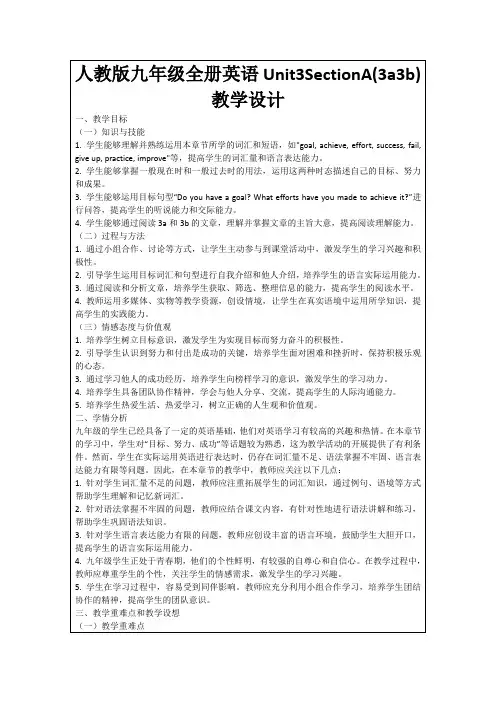
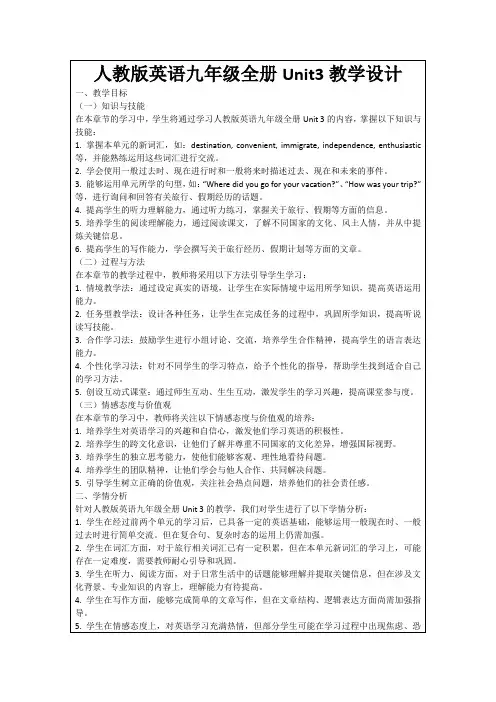
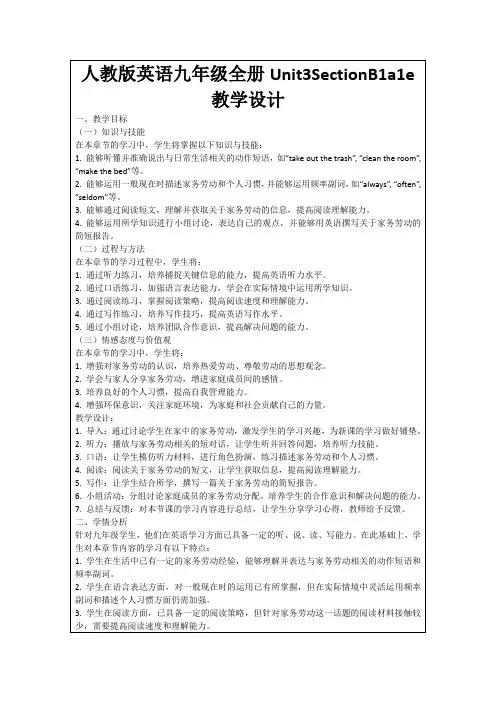
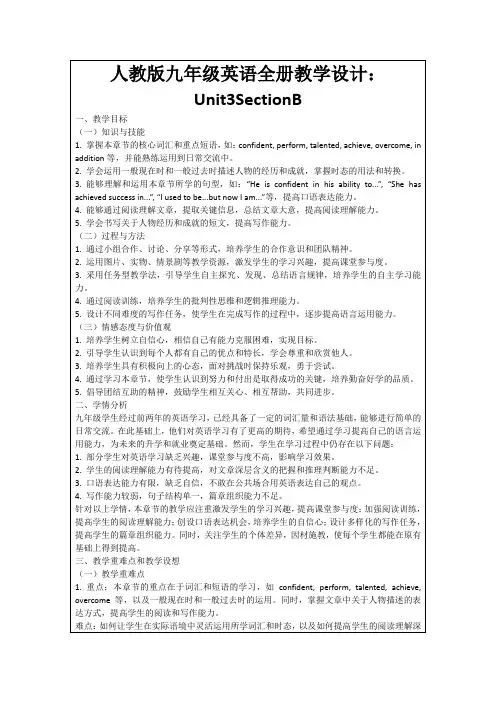
Unit 3 Teenagers should be allowed toChoose their own clothers单元分析与提示教学目标语言目标:1、掌握语言结构:should + be allowed to."2、掌握用目标语言表达agree 和disagree---- I think sixteen-year-olds should be allowed to drive.---- I disagree. I think sixteen is too young.---- Do you think thirteen-year-olds should be allowed to have part-time jobs---- No, I don’t3、词汇:allow, pierce, silly, stay up, drive, driver’s license. Do you think …I agree. / I disagree / I don’t agree.[认知目标掌握关键词汇和目标语言情感目标学会谈论自己应该被允许做的事情和不应该被允许做的事情。
学生勇于发表自己的观点和意见,表达同意和不同意,学生明白接受父母,老师的合理化建议,对他们成长的重要性。
教学重、难点1. should be allowed 为情态动词的被动语态Teenagers should be allowed to choose their own clothes ;青少年应该被允许选择他们自己的衣服。
情态动词的被动语态句型:can / may / must / should / could be + 过去分词。
All members of the audience should be dressed neatly.所有的观众应该穿着整齐。
Food or drink should not be taken into the concert hall.食物和饮料不应该被带进音乐厅。
人教版九年级全册英语Unit 3 教案Unit 3 Could you please tell me where the restrooms are?教学目标话题:游览(Getting around)功能:礼貌地询问信息(Ask for information politely)A: Excuse me, do you know where I can buy some medicine?B: Sure. There’s a supermarket down the street.A: Could you please tell me how to get to the post office?B: Sorry, I’m not sure how to get there.遵照指令(Follow directions)Go to the second floor.Turn right.语法:能正确使用含有wh-问句的宾语从句(Objective clauses with wh-questions)Excuse me, do you know where I can buy some medicine?Can you tell me when the band starts playing this evening?I wonder where we should go next.词汇和常用表达:1. 能够正确使用下列词汇(Curriculum words)restroom, stamp, postcard, bathroom, grape, corner, request, direction, speaker, address, course, rush, suggest, mail, central, east, convenient, correct, polite, direct, impolite, underground, politely, pardon, beside, whom2. 能够正确使用下列常用表达(Useful expressions)pass by, pardon me3. 能够认读下列词汇(Non-curriculum words)bookstore, washroom, normally, staff, nearby, fascinating, inexpensive, uncrowded, mall, clerk, parking lot学习策略:1. 在不同场合下礼貌地使用语言2. 结合不同文化背景得体地使用语言文化知识:了解英语中的礼貌用语Section A 1 (1a-2d)Learning Objectives1. To learn to ask for information politely.Excuse me, do you know where I can...?Excuse me, could you please tell me how to…?2. To learn to give directions.Go to the third floor.Turn left / right....between...and...Go past the bookstore.Step 1 New wordsrestroom n.(美)洗手间;公共厕所stamp n.邮票;印章bookstore n.书店beside prep.在……旁边;在……附近postcard n.明信片pardon v. 原谅interj.请再说一遍normally adv. 通常;正常情况下rush v. & n. 仓促;急促Step 2 Warming up1. Guessing gameShow pictures to the students and the sentence: Where can we…? Learn some new words: bank, post office, bookstore, department store…2. Show some pictures to students and present the new sentences:Could you tell me where I can buy some stamps?Could you please tell me where I can get a dictionary?Do you know where I can get some magazines?Step 3 Consolidation1. Match each thing with a place in the picture in 1a.___ get some money___ get some magazines___ have dinner___ get a dictionary___ get some information about the town___ buy a newspaper___ buy some stamps___ get a pair of shoes2. Read the phrases.get some moneyget some magazineshave dinnerget a dictionaryget some information about the townbuy a newspaperbuy some stampsget a pair of shoesStep 4 Listening1. Play the mp3 for the first time and ask students to listen and complete the conversations in the picture in 1a. Then check the answers with the whole class.2. Play the mp3 for the second time and ask students to fill in the blanks. Conversation 1Girl: Excuse me, could you tell me where I can buy some (stamps)?Boy: Yes. There's a post office (on) Center Street.Girl: Oh, could you tell me (how to) get to Center Street?Boy: Sure. You see that (bank) there?Girl: Hmm.. oh, yes.Boy: Just (go past) the bank and then (turn right). The post office is (on the right),(next to) the library.Girl: Thanks a lot!Conversation 2Boy: Excuse me, do you know (where I can) get a dictionary?Girl: Sure. There’s a bookstore (on) Main Street.Boy: Oh, could you please tell me how to get there?Girl: Yes. (Go along) Center Street and then (turn left) on Main Street. Then you will see the bookstore (on the other side of) the street.Boy: Thanks! Do you know when the bookstore closes today?Girl: I think it closes at 7:00 p.m. today.3. Conclusion:问路的常用句型◆Excuse me. Could/Can you tell me the way to…?◆Excuse me. Could/Can you tell me how I can get to…?◆Excuse me. Could/Can you tell me how to get to…?◆Excuse me. Could/Can you tell me where…is/are?◆Excuse me. Do you know where/how…?◆Excuse me. Which is the way to…, please?◆Excuse me. Where is …, please?◆Excuse me. Is there a/an…near here?4. Watch the flash and then role-play the conversations.Step 5 PracticeAsk students to make conversations using the information in 1c and talk about their own town /city. For example:A: Excuse me, _______________________________?B: Sure, just … Street until you pass…. The … is on your …, beside the ...A: Thanks. Do you know when … closes today?B: It closes at ... today.A: Thank you!B: You’re welcome.Step 6 ListeningWork in pairs. Show the picture and ask:What place does the picture show?What shops can you see in the picture?How many floors can we see in the picture?If I want to buy…, what shop should I go to? And how can I get there?1. Play the mp3 of 2a and ask students to number the directions in the order that they hear them.___ Go to the third floor.___ Turn left.___ Go to the second floor.___ Turn right.___ The supermarket is between the flower store and the bookstore.___ Go past the bookstore.2.Play the mp3 of 2a again. Ask students to draw a line in the picture in 2a to show how the boy walks to the supermarket. Then get one student draw the line on the blackboard.3. Play the mp3 the third time and ask students to answer the questions.1) What does the boy want to buy?2) Where can he buy it?3) When does the shopping center close?4) Does the other boy know when it closes?5) What does he suggest?Step 7 PracticeAsk students to make conversations about the other places in the picture in 2a.A: Excuse me. Can you tell me where I can buy some flowers?B: Yes, there’s a flower shop in this shopping center.A: Do you know how to go there?B: Yes. Go to the second floor and turn left. Then go past the bookstore. The flower shop is between public phones and the supermarket.A: OK, great. Oh, and one more thing. Do you know …?B: I’m not sure, but you …A: OK, thanks a lot.B: You’re welcome.Step 8 Role play1. Ask students to read the conversation in 2d and answer the questions.1) Where are He Wei and Alice?2) What different parts does Fun Times Park have?3) Alice used a word that He Wei didn’t fully understand at the beginning. Whatwas that word?4) How did Alice help He Wei to understand her?Note: 英语中常见表示“厕所”的委婉表达有:restroom, washroom, bathroom, Men, Men’s, Men’s room, Gent’s, Women, Women’s, Ladies’, comfort room等。
Unit 3 Could you please tell me where the restrooms are?一、教学目标:1. 语言知识目标基本词汇:restroom, stamp, bookstore, postcard, pardon, washroom, bathroom,normal, rush, suggest, staff, grape, central, mail, east, fascinating,convenient, mall, clerk, corner, polite, politely, speaker, request,direction, correct, direct, whom, address, underground基本句型:Excuse me, do you know where I can buy some medicine?Sure. There’s a supermarket down the street.Could you please tell me how to get to the post office?Sorry, I’m not sure how to get there.I wonder where we should go next.Could you tell us when the band starts playing this evening?You should try that new ride over there.2. 技能目标: (1)能用宾语从句礼貌的寻求帮助。
(2)能用正确的方法指路。
3. 情感目标: 培养学生尊重他人,对人有礼貌,热爱生活。
二、教学重难点:1. 教学重点:(1)礼貌的向他人寻求帮助。
(2)正确使用宾语从句。
2. 教学难点:运用宾语从句礼貌的寻求帮助。
三、教学步骤:Section A 1 (1a-2d)Step 1 Warming –upGreetingStep 2 Presentation(1)Guessing gameShow pictures to the whole class, one student explains the places in English and another one who doesn’t look at the blackboard guesses what place it is. For example, one student say: We can save money or exchange money in this place, another one guess it is a bank. Get students to guess the places like bank, post office, bookstore, museum, bathroom, washroom, mall and so on.(2)Show some stamps to students and present the new sentences:Could you tell me where I can buy some stamps?Could you please tell me where I can get a dictionary?Do you know where I can get some magazines?Step 3 Practice1) Match each thing with a place in the picture in 1a.2) Read the phrases.___ get some money___ get some magazines___ have dinner___ get a dictionary___ get some information about the town___ buy a newspaper___ buy some stamps___ get a pair of shoesStep 4 ListeningListen and complete the conversations in the picture in 1a. Then check the answers with the whole class.Step 5 PracticeMake conversations using the information in 1a. Then talk about your own city. For example:A: Excuse me, could you please tell me how to get to the bookstore?B: Sure, just go along Main Street until you pass Center Street. The bookstore is on your right, beside the bank.A: Thanks. Do you know when the bookstore closes today?B: It closes at 7:00 p.m. today.A: Thank you!B: You’re welcome.Step 6 Listening1. Listen and number the directions in the order that you hear them.2a You will hear some of the directions below. Number the directions in the order you hear them.___ Go to the bird floor.___ Turn left.___ Go to the second floor.___ Turn right.___ The supermarket is between the flower store and the bookstore.___ Go past the bookstore.2. Listen again. Show how the boy walks to the supermarket. Draw a line in the picture in 2a. Then get one student draw the line on the blackboard.3. Listen the third time and answer the questions.1) Excuse me, can you tell me where I can buy some medicine?2) Do you know how to go there?3) Ok, great. Oh, and one more thing. Do you know when this shopping center closes tonight?4) Ok, thanks a lot.Step 7PairworkMake conversations about the other places in the picture in 2a.A: Excuse me. Can you tell me where I can buy some stamps?B: Yes, there’s a post office in this shopping center.A: Do you know how to go there?B: Yes. Go to the third floor and turn right. Then go past the bank. The post office is between museum and library. You should be able to get stamps.A: Ok, great. Oh, and one more thing. Do you know …B: I’m not sure, but you …A: Ok, thanks a lot.B: You’re welcome.Step8 Reading1. Read the conversation in 2d and answer the questions.2. Role – play the conversation.3. Explain the language pints in 2d.(1) Go along Main Street until you pass Center Street.1) until和till同义为―直到……‖,till多用于口语,until可以放在句首,till则不能放在句首。
2) not...until―直到……才‖,表示直到某一时间, 某一行为才发生, 之前该行为并没有发生。
e.g. I did not study English until 9 o'clock last night.(2) Pardon? Restroom? You already want to rest? But we haven’t even started yet!1) pardon用作动词,后面既可以跟宾语,也可以跟双宾语;pardon sb. for doing sth.意为―原谅/宽恕某人做某事‖e.g. Can you pardon me for not passing the exam, Mom?2) 在没有听懂对方的话,请对方重复一下时也可说pardon。
e.g. Pardon? I’m sorry I can’t follow you.(3) I’m excited to try the rides!excited和exciting的区别:1) excited意为―激动的;兴奋的‖,作表语时,主语通常是人;作定语时,常用来修饰人,说明激动的表情。
e.g. All of us were excited when we heard the good news.The excited child opened his present quickly.2) exciting意为―激动人心的‖,作表语时,主语通常是物;作定语时,常用来修饰物。
e.g. The movie is very exciting.My father told me an exciting story.(4) I mean … you know, a washroom or bathroom.mean作动词有以下含义:1) 有……的意思,指(多作及物动词),其后可跟名词或代词,也可跟从句。